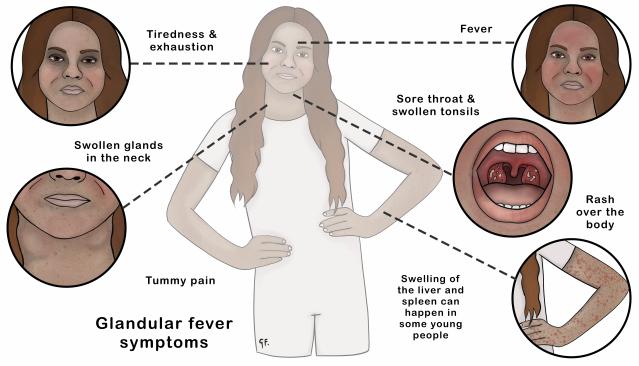Key points about glandular fever
- glandular fever is caused by the Epstein-Barr virus
- it is a common condition that mainly affects older tamariki and teenagers
- glandular fever is spread from person to person through saliva
- common symptoms include sore throat, swollen glands and tiredness
What is glandular fever?
Glandular fever (also known as infectious mononucleosis) is caused by the Epstein-Barr virus. This virus spreads from person to person through saliva. That’s why sometimes glandular fever is called the ‘kissing disease’.
Signs and symptoms of glandular fever

Symptoms of glandular fever can develop slowly over weeks.
Symptoms can include:
- a sore throat (which can last for several weeks)
- fever (temperature over 38 degrees Celsius)
- feeling generally unwell, tired and exhausted
- sore, enlarged lymph glands, mainly around the neck (sometimes in the groin and armpits)
- a red, spotty rash over the chest, back and stomach
- tummy pains
Some glandular fever symptoms, especially tiredness, can last for weeks or even months.
Some tamariki with glandular fever can also have swelling of the liver and spleen.
How glandular fever spreads
Glandular fever is caused by the Epstein-Barr virus. This virus spreads from person to person through contact with saliva. This could be from things such as kissing or sharing cups, drink bottles, toothbrushes, cutlery or toys.
Symptoms of glandular fever normally start around 4 to 6 weeks after being exposed to the virus.
Who gets glandular fever
Glandular fever is common in older tamariki and teenagers. If your child has had glandular fever they will usually develop immunity to the Epstein-Barr virus. People who have had glandular fever don’t usually get it again.
Testing for glandular fever
If your child is unwell and you are worried they may have glandular fever, take them to a health professional. If the health professional suspects your child has glandular fever, they may request a blood test to check for it.
When to get medical help for your child
Call Healthline on 0800 611 116 or take your child to see a health professional if they have glandular fever and any of the following symptoms:
- a sore throat that isn’t improving after 5 days
- swollen glands that stay swollen and painful for more than a few days
- extreme tiredness that doesn’t improve with rest
- tummy pains
If you are worried about your child for any reason, take them to a health professional.
See a health professional urgently if your child has extreme tummy pain.
Healthline is available 24 hours a day, 7 days a week on 0800 611 116. Call Healthline if you need advice about a child of any age who is unwell, hurt, or has any symptoms of sickness. It's free to callers throughout New Zealand, including from a mobile phone.
Managing glandular fever
There is no specific medicine or cure for glandular fever. Treatment focuses on helping improve symptoms.
Pain relief
If your child has pain, you can give paracetamol to make them more comfortable. You must follow the dosage instructions on the bottle. It is dangerous to give more than the recommended dose.
Never give your child aspirin, as this may increase the risk of Reye syndrome, which is a rare and serious illness.
Rest
Make sure your child gets plenty of rest. Avoid strenuous activity until they are feeling better. Your child can slowly increase their activity as they get better.
Healthy diet
Give your child a healthy, balanced diet and make sure they drink plenty of fluids.
Possible complications from glandular fever
Complications from glandular fever are rare. Some tamariki and teenagers with glandular fever may get another infection, such as a lung infection (pneumonia) or liver infection (hepatitis).
Your health professional may check for swelling of your child’s liver or spleen. If they are concerned, they may advise your child to limit contact sports for 3 months. Contact sports increase the chance of spleen injury.
How long glandular fever lasts
Most tamariki and teenagers will feel better after 2 to 4 weeks. Some symptoms, like tiredness, can last up to a few months. If you are worried your child has ongoing symptoms, take them to a health professional.
Preventing the spread of glandular fever
When your child feels well enough, they can return to school. You don’t need to keep them home to control the spread of glandular fever.
Encourage good hand washing as this helps prevent the spread of viruses. Make sure your child doesn’t share drink bottles, cutlery and toothbrushes with other people.
Acknowledgements
Illustration by Dr Greta File. Property of KidsHealth.

